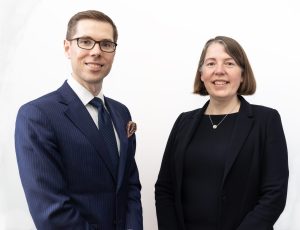Changes to the amount a spouse inherits when someone dies without a Will
Spouses inheritance increased by £52,000
The amount inherited by a surviving spouse when there is no Will (known as the statutory legacy) has been increased from £270,000 to £322,000. The change took effect for anyone dying on or after 26 July 2023. According to research by NimbleFins, the average net value of an estate in the UK was £334,173 in 2019/20 which is slightly above the new statutory legacy amount. However, the figures for the average net estate are based on those reported to HMRC and only represent around 45% of all deaths that year. Therefore, for many people their entire estate would be covered by the statutory legacy. However, this still leaves a significant amount of people with net estates above this amount.
What are the Intestacy Rules?
Who inherits when there is no Will is determined by the rules of Intestacy. The rules set out which family members inherit.
If the person that died was married
Their widow or widower inherits everything if they were married and had no children (or other descendants).
If they were married and had children, then the surviving spouse inherits the statutory legacy, personal possessions and half of everything else. The children inherit the remaining half (or if they have also died, their descendants would inherit on a ‘per stirpes’ basis).
Per Stirpes means the inheritance passes down so that each branch of the family receives an equal share. For example, if a person (let’s call them Z) died leaving two children (A and B) and two grandchildren (X and Y who are both children of A), then A’s share would be given to X and Y if A died. This would mean B would inherit 50% of Z’s estate with X and Y inheriting 25% each (as they inherit half each of A’s share).
If the person that died was not married
If they had children, then the children inherit everything equally between them. Their descendants would inherit on a ‘per stirpes’ basis if they also died.
When there are no children then it passes to their parents.
If they had no children, descendants or parents, it continues to the next nearest relatives. This starts with siblings and continues until there are no relatives left in which case the Crown would inherit.
What is the Statutory Legacy?
The statutory legacy is the fixed amount that passes to a surviving spouse when someone dies without a Will. This is the amount that has been increased from £270,000 to £322,000 meaning that a surviving spouse now receives an additional £52,000.
What does a surviving spouse inherit when someone dies without a Will?
The current position
If their spouse died without leaving children or descendants they inherit everything.
If their spouse died leaving children or descendants then they inherit the first £322,000 plus personal possessions and half of everything else.
What do unmarried couples or common law partners receive when someone dies without a Will?
A popular misconception is that couples who live together (sometimes referred to as ‘common law partners’) have the same legal standing as married couples. This is not the case. In England, unmarried couples or common law partners do not inherit anything from their deceased partner under the intestacy rules. If the person that died has children, they will inherit everything.
Why a Will is still important
Although the amount a surviving spouse inherits has been increased, for many couples it does still not cover everything they own. This can mean their children inherit earlier that expected and it can also have adverse consequences for Inheritance Tax. Even if the rules currently meet your wishes, the rules can be changed and may no longer do what you expect them to do.
A Will ensures that your estate is inherited by the people you choose when you die. You can appoint ‘guardians’ to look after your children if they are under the age of 18 when you die and you may also choose to appoint these guardians as ‘trustees’ to look after your children’s inheritance. Please see our article ‘do I need a Will?’ for further information about why it is important to make a Will.
Contact us if you have any questions
If you have any questions about this article or would like to discuss making a Will please contact Paul Clark or Sarah Bushell on 01260 769 639. We offer a free initial consultation at our Congleton office or in your own home. Alternatively, meetings can be carried out via telephone or online (e.g. via Teams).









